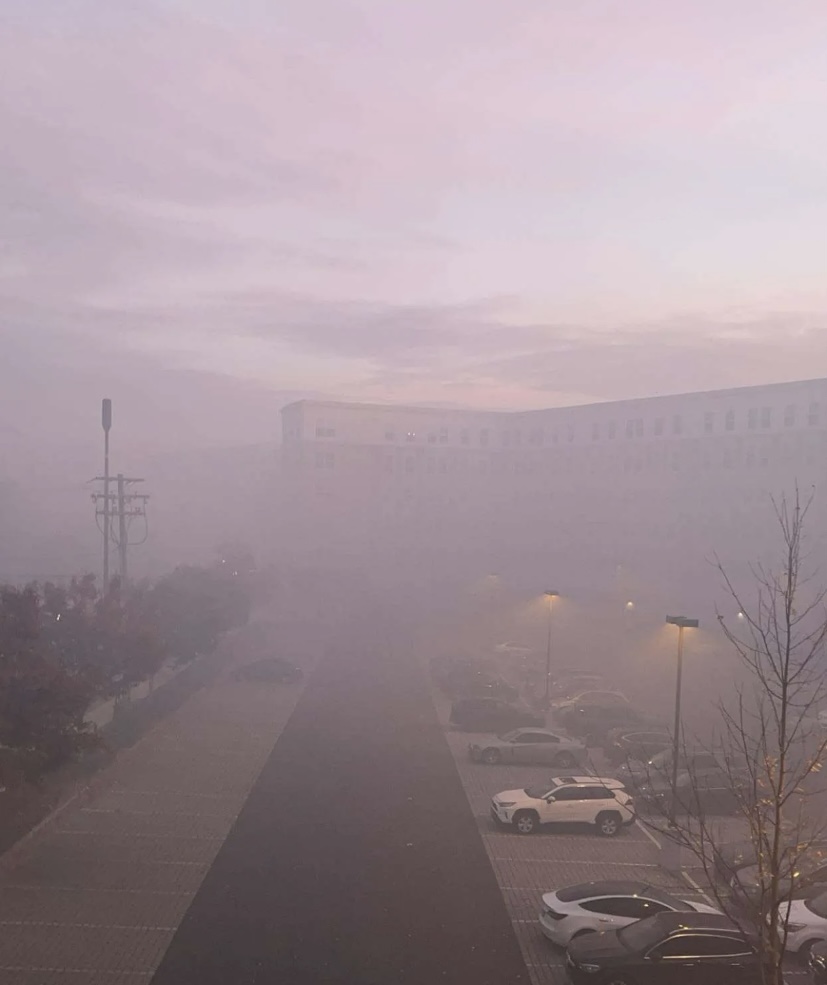The consequence of 42 consecutive days without measurable rainfall in South Jersey was showcased on Nov. 9 in Glassboro.
Rowan students awoke Sunday to the smell of smoke and a haze in the atmosphere that made the air thick and smoggy.
An email from the university that day stated “[t]here is no immediate threat to the campus,” nevertheless, there was a heavy presence of smoke along with a burning smell in the atmosphere.
Fire alarms around campus were set off due to the conditions of the air, and there were also multiple reports made to 911 that carbon monoxide detectors were being set off in area homes.
Official warnings throughout the state warned residents to stay inside and keep pets inside as much as possible, with doors and windows closed to avoid the worst possible effects of breathing in the smoky air.
Andra Garner, PhD is an associate professor in Rowan University’s department of environmental science.
“Normally, the atmosphere near Earth’s surface cools as we ascend to greater heights; but during a temperature inversion, the surface cools more quickly than the air above it, and the part of the atmosphere closest to the surface actually gets warmer with height. That warmer air above the surface acts as a ‘lid,’ trapping the cold air—and anything in it, such as smoke—near the surface until the sun rises and allows the surface to warm again. This is precisely what we saw happen in the Glassboro area from Saturday night into Sunday morning,” said Garner in a short written explanation for social media.
The wildfire most impacting the Glassboro area ended up burning 133 acres of the area controlled by Glassboro Wildlife Management.
Amanda Lee, meteorologist for the National Weather Service, said the combination of lack of rain, dry vegetation, and higher wind gusts exacerbated the potential for a fire to occur. With Sept. 28 being the last day with measurable rainfall until the fire, Lee said the previous consecutive streak without measurable rainfall was 29 days.
“We received some measurable rainfall yesterday [Nov. 12] but that’s only a small dent in conditions we’ve been seeing,” said Lee. “While that’s not really enough to decrease the drought we’re experiencing, what that at least does is it’s sufficient to be what we call wedding rain.”
A drought was officially declared by the Department of Environmental Protection (DEP) for the first time in eight years on Nov. 13.
Three counties in New Jersey are considered to be in “extreme drought” conditions, while conditions throughout the rest of the state are considered to be moderate to severe.
Officially called a water supply drought warning, the decree was made in the wake of the lack of adequate rain and water supplies rapidly shrinking.
The official designation will give the DEP more ability to make water distributors transfer enough water for drinking to all regions, specifically the areas throughout New Jersey that have been most impacted by dwindling supply.
The state will now also be able to make suppliers come up with alternative sources for their water, to prepare for a worst-case scenario in which supply is dangerously low.
South Jersey and Glassboro were not the only places impacted, as much of New Jersey has been affected by the lack of rain, leading to acres of burning forestland across the state.
Some of the areas currently affected by fires are due to fires set, intentionally or unintentionally, by people in the area.
A wildfire in Evesham Township that burned 52 acres of land was allegedly set on purpose by a 14-year-old boy in Marlton. Another wildfire that burned 350 acres and caused evacuations of nearby residents in Jackson Township was allegedly started when a man illegally fired a gunshot. The man was charged with arson and violation of the regulatory provisions relating to firearms. The teen has been charged with aggravated arson and causing or risking widespread injury.
Across the entire state, thousands of acres of land have burned or are burning as fire crews work to manage and contain the various blazes. The largest fire in Mammoth in North Jersey claimed the life of 18-year-old firefighter Dariel Vasquez. No reports of further fatalities, injuries, or any destruction or damage of structures have been made public at this time.
Residents throughout the state are asked to avoid outdoor burnings and any activities that may result in sparks, as those can catch on the dry brush throughout the region and cause further burning or exacerbate conditions of already existing fires. When disposing of any material that could ignite are asked to act with extreme caution.
Officials also urge that those in areas impacted by smoke refrain from strenuous activity that will lead to heavier breathing, properly wear an N95 mask if one must go outside, and be aware of the AQI forecast, which measures poor air quality. The number for the state’s Air Quality Hotline is (800) 535- 1345.
Due to the newly issued drought warning, state officials have also advised residents to adapt their water usage habits accordingly. Let lawns go dormant for the winter season by no longer watering them, winterize all outdoor areas and close irrigation systems for the season, and replace bathroom appliances, like toilets and showerheads, with low-flow options and fix leaks in pipes and faucets.
For comments/questions about this story DM us on Instagram @thewhitatrowan or email [email protected]























































































































































!["Working with [Dr. Lynch] is always a learning experience for me. She is a treasure,” said Thomas. - Staff Writer / Kacie Scibilia](https://thewhitonline.com/wp-content/uploads/2025/04/choir-1-1200x694.jpg)














































